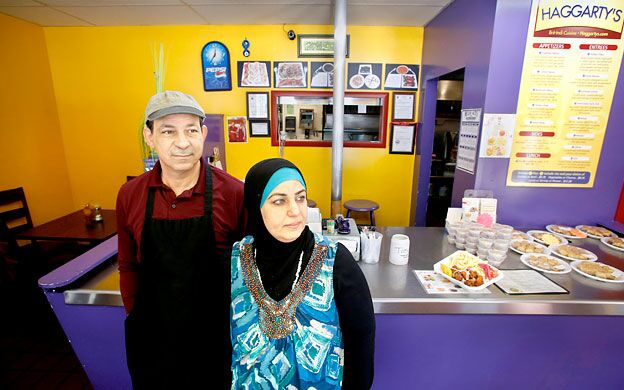CEI loan fund seeks 'socially conscious' investors
For 11 years, Saeed Saeed and his wife, Anaam Jabbir, ran a flourishing take-out restaurant in a suburb of Baghdad. They sold falafel, shawarma and other Iraqi fast foods. Their restaurant flourished. Then came the 2003 invasion of Iraq, which forced the family of five to flee first to a refugee camp and then, in 2008, to Atlanta.
"It was so, so tough," says Anaam. "The only way to speak to people is using our hands. We all came to the United States with zero language."
A friend, aware of their difficulties adapting to big city life, encouraged them to come to Maine. While working as a housekeeper at a Portland hotel, Anaam was introduced by a friend to Coastal Enterprises Inc., a nonprofit community development corporation based in Wiscasset, which offers loan and business assistance programs. Two years later, the couple is running their own take-out restaurant on Forest Avenue.
"This is the first step," Saeed says. "We hope to be bigger someday, have a place with many, many tables … From here we can go in many directions. Another thing: I want to see all my children go to college and finish college. When they have a good future, I am happy for them."
The couple tapped CEI's Individual Development Account matched savings program, which helps people with modest means save toward the purchase of homes or businesses, and its StartSmart program for business counseling. But it was a low-interest, $25,000 loan from CEI's newest affiliate, CEI Investment Notes Inc., that helped them clear the final hurdle.
CINI and its CEI business-counseling connection are prime examples of "impact investing," an emerging community development financing tool in which the financial return, although important, is of less concern to the publicly motivated and socially conscious investor than the opportunity to do good.
"It's a fuzzier notion than guaranteeing a 9% return on investment," acknowledges Ronald Phillips, president and CEO of CEI, which has provided $461 million in financial support to 2,251 businesses since 1977. "It's investing in people who are figuring out their lives along with us. It gives socially minded investors a chance to create opportunity for disenfranchised people and communities."
CEI's new venture
CEI is in the early stages of a $20 million capitalization effort to fund CINI, which is managed by CEI Senior Vice President Ellen Golden, who will oversee impact investments that meet its triple-E bottom line goals:
- Economy: Does it contribute to the local economy by generating good jobs, creating a value-added product or by helping sustain a vital industry?
- Equity: Is this an opportunity for people to access information, housing, financial resources, ownership or employment?
- Ecology: Does this benefit or lessen impact on the natural world by improving the stewardship of natural resources, or by reducing energy use, waste, pollution or materials used?
Phillips says the emerging field of impact investing doesn't target a specific class of investor. The investors run the gamut, he says, from fixed-income retirees seeking a modest but safe yearly dividend to equity partners who normally are willing to assume high risks to achieve high rates of return. The common denominator along that continuum, he says, is the desire of prospective impact investors "to do better things with their money" than simply make more of it.
Ironically, Phillips says, CEI's launch of CINI in October 2009 — in the middle of the Great Recession — provided an investment vehicle for people who were appalled by some of the shady investment practices that led to the near-collapse of Wall Street in the fall of 2008.
"The crash came suddenly, wealth is being lost, people are stunned," he says, "People are asking, 'What's going on here? Where can I put my money and not hurt people? There's got to be a better way.'"
To date, he says, CINI has raised more than $3.5 million from 68 individual and institutional investors. To qualify, individual investors must be accredited — having a net worth of at least $1 million (excluding equity in primary residence) or annual income of at least $200,000, or above $300,000 for couples. Institutional investors include banks, insurance companies, registered investment companies, some employee benefit plans, and charitable organizations or trusts with assets exceeding $5 million.
The investment notes offer fixed rates, from 2% to 3.5%, over terms ranging from three to 10 years. Accrued interest is paid annually, but Phillips says investors can opt to have those payments deferred and added to their principal. Purchases start at $5,000 and can go to $500,000 or higher, and the principal will be paid on maturity — or it can be reinvested through purchases of additional notes.
Funds raised through the program are pooled and used by CEI "to provide patient loan capital to projects" that have been identified as likely to provide the triple-E returns. Investors have no control over investments or the management of the program loans, which are overseen by CINI staff.
"We're audited, we have a great board of directors, and we have policies in place to manage CINI's loans," Phillips says. "So when you contribute your funds or purchase a note, you can trust that it's being managed according to procedures and policies that have guided CEI for 35 years now."
In its 10-year business plan, based on CEI raising $20 million for CINI, the program is expected to make 320 loans, leverage an additional $59 million in funding from other sources, create or retain 2,000 jobs, create 200 units of affordable housing and expand social services such as child care, health clinics and assisted-living housing in rural communities.
Making a difference
Phillips says CINI's business plan is based on the premise that companies have other stakeholders besides equity owners. So besides helping borrowers be profitable and pay off their loans, the CINI team works with those companies to make sure they're also meeting the needs of vendors, customers, employees and their community.
It also assumes that in evaluating prospective borrowers, CINI's managers might decide a project is better suited for funding available through other CEI programs, which include below-market, investment loans and a variety of state and federal tax credits.
"We have five buckets to choose from," Phillips says. "Which bucket or buckets will work best? CEI is the locus of the whole array of options available. We're a general resource, and if we can't do the deal by ourselves, we'll find ways to partner with someone else."
That financing versatility, coupled with CEI's business counseling resources and strong commitment to socially responsible investments, is something Susan Corbett, owner of Machias-based Axiom Technologies LLC, appreciates. Her company is extending broadband Internet access to households and businesses overlooked by other providers. Axiom has received $175,000 in aggregate financing from CEI over the years, but nothing from CINI, as yet. Phillips makes the point that impact investing isn't limited to CINI, but cuts across the entire CEI portfolio.
"There's a social mission that connects us," says Corbett, who has been championing broadband service in Washington County since purchasing the company in 2005. "My work is all about the positive impact we can have by deploying broadband Internet service in under-served communities. If we're successful in doing that, we're helping other businesses succeed too. CEI recognized early on that if we can help other businesses achieve their full potential, our communities will benefit as well. Everyone benefits."
ReVision Energy, like Axiom, has had a longstanding relationship with CEI that stems in part from having shared values — in its case, bringing solar energy to the forefront as an affordable and renewable energy source.
"A major part of our mission is to create sustainability for our region," says Bill Behrens, a founding partner of ReVision Energy. CEI has invested $500,000 in ReVision, $50,000 of which came from CINI.
Behrens says ReVision Energy is using the capital to install solar power at buildings owned by nonprofits, schools and municipalities. ReVision covers the cost of the equipment; the building owner agrees to buy the generated electricity at a fixed or below-market rate. After a pay-off period of about six years, the owner can buy the solar panels from ReVision at a fraction of the original cost.
While the project is a break-even proposition for ReVision, Behrens sees it as an investment that moves Maine toward greater energy independence and away from power sources that contribute to global warming.
Randy Rice, community impact investing manager for Trillium Asset Management LLC in Boston — a $1 billion investment firm devoted to sustainable and responsible investments — says he's directed investors to CINI's Investment Notes program. Some, he says, have a particular interest in Maine, some in the kind of socially responsible investments CEI has been making for 35 years, and some for both reasons.
"This is not philanthropy," he says. "It's an investment with a modest return. Before we invested our clients' money in CEI, we exercised full due diligence to make sure it was a sound investment."
Correction: This story has been updated to reflect the requirements for would-be investors in CEI's Investment Notes program.












Comments